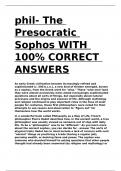phil- The
Presocratic
Sophos WITH
100% CORRECT
ANSWERS
As early Greek civilization became increasingly refined and
sophisticated (c. 500 b.c.e.), a new kind of thinker emerged, known
as a sophos, from the Greek word for "wise." These "wise men"(and
they were almost exclusively men) asked increasingly sophisticated
questions about all sorts of things, but especially about natural
processes and the origins and essence of life. Although mythology
and religion continued to play important roles in the lives of most
people for centuries, these first philosophers were noted for their
attempts to use reason and observation to "figure out" for
themselves how the world works.
In a wonderful book called Philosophy as a Way of Life, French
philosopher Pierre Hadot describes how, in the ancient world, a true
philosopher was usually viewed as someone out of step with daily
life. To be a "philosopher" was to be "different." As you learn more
about the ancient sophos, you can decide for - answer The sorts of
atypical traits Hadot has in mind include a lack of concern with such
"normal" things as practicing a trade (having a regular job),
pursuing wealth, or desiring fame and power. The sophos was
someone who devoted himself to asking questions that other people
thought had already been answered (by religion and mythology) or
,were unanswerable (and thus a waste of time). The sophos lived and
spoke in ways that were interpreted as showing disregard for
conventional values and that set him apart from "regular folks"
living "normal" lives.
It is hardly surprising, then, that one of the earliest popular images
of philosophers is the stereotype of a shabby, unkempt, "absent-
minded," starry-eyed dreamer and an asker of silly questions.
Socrates (Chapter 4), perhaps the most-recognized example of the
ancient Western sophos, was even called "unclassifiable" (atopos)
because he was a "philo-sopher" in the archetypal sense: a person
in love with wisdom. In Plato's Symposium, Diotima, an ancient
woman philosopher whom Socrates referred to as one of his
teachers, says that wisdom is not a human state at all, but a
"divine" level of perfection and knowledge. If these ancient
commentators are correct, the sophos is always a "stranger to the
world."
From Sophos to Philosopher
In his earliest incarnations, the Western sophos was predominantly
a sage, or "wise man," in the general or generic sense. He was not a
professional thinker. That is, he did not charge people fees (tuition)
to study with him or to accompany him. His relationships with his
students were personal, complex, and long-lasting. In many cases
his pupils were more like disciples than like paying students.
We cannot help but wonder what philosophy may have lost by
overlooking the contributions of women philosophers for so long.
Dea/G. Nimatallah/De Agostini Picture Library/Getty Images
"Woman as Sophos"
Aesara of Lucania (c. fourth century b.c.e.-first century c.e.) was a
Pythagorean philosopher who has only recently attracted any
attention. In the single existing fragment of her book—On Human
Nature, she says that through the introspection and contemplation
of our own souls we can discover the "nat - answer The very first
Western thinkers identified as philosophers were initially concerned
with questions about the nature of nature (physis) and of the "world
order" (kosmos). Today, we would classify many of their concerns as
scientific. It would be a mistake, however, to think that ancient
philosophers "specialized" in the modern sense. Indeed, Plato and
, Aristotle (Chapters 5 and 6) were interested in ethics, logic,
language, art, human nature, politics, and mental and physical
health. Aristotle was also interested in physics, biology, botany, and
anatomy.
In Greece wise men speak and fools decide.
— Anacharsis
Whereas the sophos (sage, or wise man) was seen as a kind of
prophet-priest-therapist, the philosopher, who is in love with
wisdom but not necessarily wise, was seen as an unusual sort of
thinker and truth-seeker. Thus, we notice an ambiguity in the early
use of the word "philosopher" that carries over into the present day.
Whereas initially the philosopher, like the sophos, was expected to
live a "philosophical life," today a philosopher is not required to live
a wise life but to devote his or her energies to "thinking" about
certain things in a rigorous way. In Chapter 18 we will see the very
notion of being a philosopher come under scruting as contemporary
philosophers challenge the possibility of objectivity and universal
truth.
The Search for a Common Principle
The earliest Western philosophers are referred to as the
Presocratics because they appeared prior to Socrates, the first
major figure in the Western philosophical tradition. Some of the
Presocratic philosophers are described as proto-scientists because
they initiated the transformation of mythology into rational inquiry
about nature and the cosmos. In the beginning, the difference
between a philosopher and a proto-scientist was one of subject
matter; later it became one of method. A general understanding of
the development of Presocratic philosophy is helpful for placing
subsequent philosophical issues and disagreements in context.
As you study the Presocratics, note how they struggle to offer
rational arguments and explanations for their views. Note, too, their
efforts to be objective and to uncover universal (general) principles.
Also note the role that language plays in the develo - answer As
significant and interesting as the Presocratics are, they lived and
thought in a radically different world from ours. Consequently, what
is obvious to us might have been unthinkable in their world, and
what was obvious to them might be obscure or unfathomable to us.




